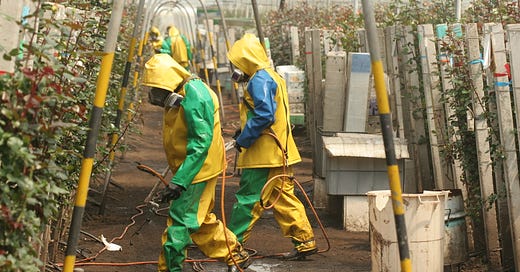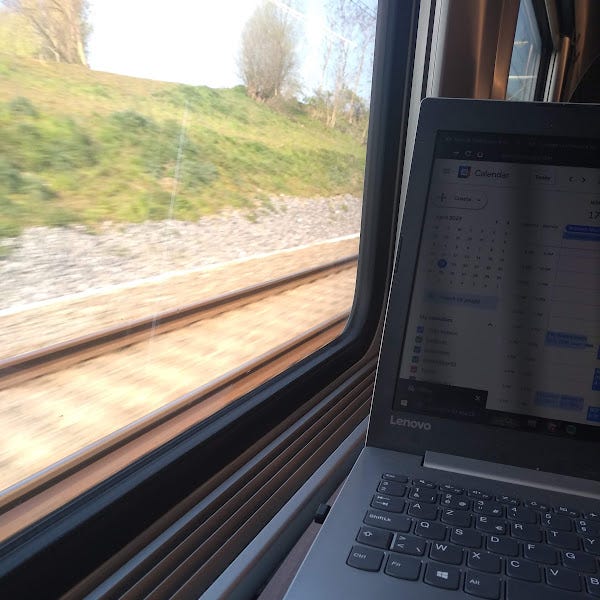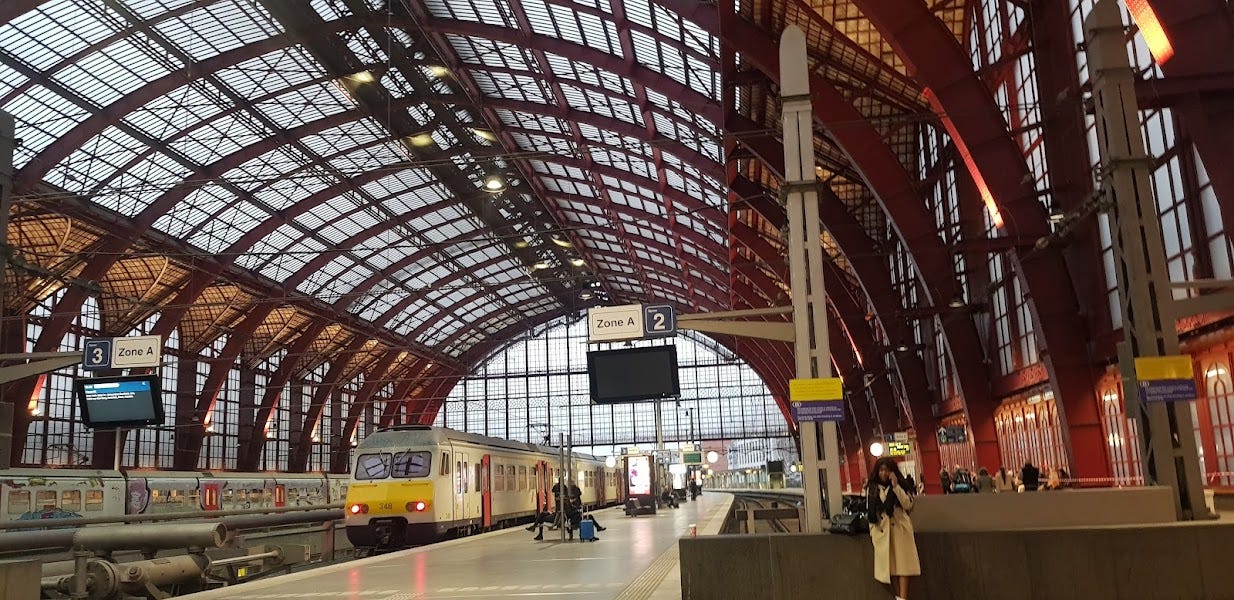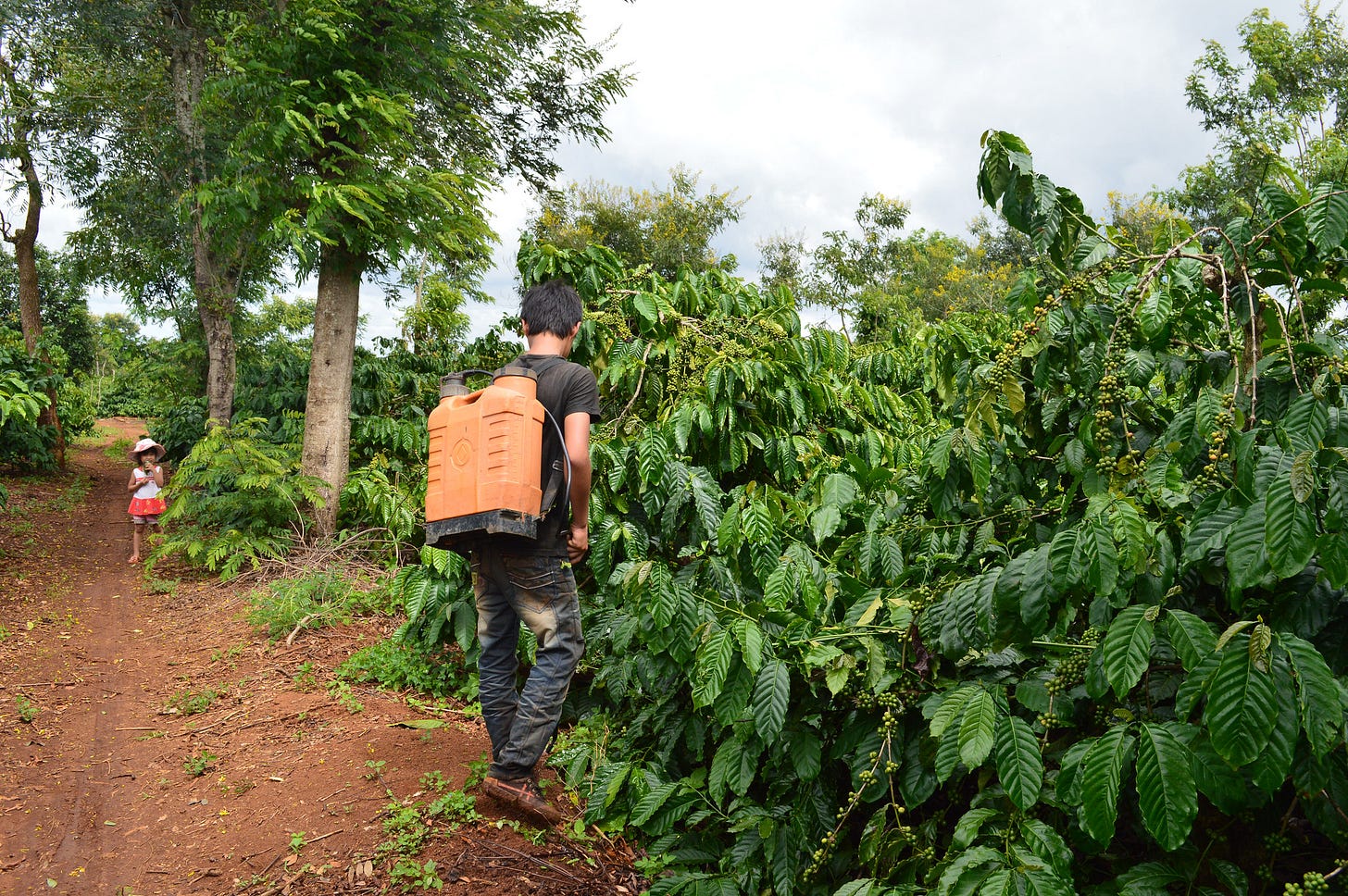Spoiler: The EU is in (another) toxic relationship
It's those pesticides they told you not to worry about.
It’s natural to want a change, my friend said. All things considered.
I don’t want to consider all things. People drown in too many Considerations.
Maybe it’s chronic. Maybe it’s Maybelline. But I keep going away. I have motion sickness. I diagnosed myself from WebMD.
See, I am travelling soon. Moving, actually. Doing the whole digital nomad thing, like the rich influencers sans fancy Macbook Air or influence.
I was certain, deadset on it, until everything was booked and the date was announced. Like someone desperate to get out of a party, suddenly I was knocking on the door asking to be let back in. To familiarity and stability.
The things we hate, the things we crave. The things that are only ever fragile in a climate and age of continuous uncertainty.
It’s the being in your mid-20s in the mid-2020s condition. Everything is changing, whether we like it or not. We can’t stay still long enough to set down roots. Why would we? Nobody can build a home on unstable ground. Who can commit when every job is a stepping stone, every address is a rental, every year might be The Last Chance to visit that country before it’s unlivable and before AI renders your job redundant?
Where do you want to go? Well shit, Trainline, what was the point of asking you if you would just ask me back?
I browse Instagram Explore to look at pictures of Barcelona - then Oslo, Copenhagen, Tokyo, Melbourne, Ljubljana, Medellín, Vancouver, Toronto - everything seems possible and fast slipping out of reach. I’m afraid that if I don’t go now, I’ll never go at all.
My friends are buying houses and getting married. I’m jealous of them and I’m even more afraid of saddling myself with the same commitment.
Digital nomading has a transient not-here-not-anywhere element that seems to fit a planet and age defined by metamorphosis.
As the climate destabilises the fragile basis of our economies and social norms, we’re cut loose from the traditional trajectories laid out for us. It is the beauty and the horror of the decade. The world in 2030 will not be the world now and I will not exist at 30 as I am now. How can I plan the life of a woman I do not know yet, in a world I have never visited?
So I’m leaving again. Why should I settle? How can I want more?
***
If you like this newsletter, please help me by sharing it using the button here:
What’s Going On?
It’s very very hot.
Related: Heatwaves caused deaths of around 61,000 people in Europe last year.How a major farming lobby is pretending to represent all farmers and using funds to hold back the EU Green Deal.
Related: More sustainable soil management could limit world heating to 1.5 degrees.Leak reveals how UAE planned to drop ‘oil’ from name of national oil company ahead of hosting UN climate conference to look more green.
Related: Research shows no oil and gas companies have plans to phase out fossil fuels.Ecuador approaches major vote to keep Amazon oil in the ground.
Related: Maintaining Amazon rainforest could generate €8 billion for bioeconomy.Pacific island nations and trade-reliant countries manage to compromise on new shipping net-zero climate targets.
Useful: What is so environmentally bad about shipping?
By the way…
We make about 10 euros per edition of this newsletter and it takes approximately 10 hours to create.
If you find The Green Fix useful, please consider tipping a virtual coffee.
Focus On… Pesticides
Issy Pountney interviews Kim Schoppink, Global Advocacy Lead at the Rainforest Alliance, about how pesticides are leaving a toxic trail around the world.
I work for the Rainforest Alliance. We work to help ensure that rural communities earn a good livelihood, but also nature is protected. We do that in a few different ways.
The most known is our certification program, where we certify farms who comply with our extensive standards, encouraging them to adopt practices such as agroforestry, integrated pest management, soil conservation, and water management.
Then we have landscape programs that focus on bringing farmers farming different crops on land with high biodiversity value and other land users together to foster collaboration and promote sustainable land management practices .
And we have advocacy, where I work. I focus mainly on policies that are related to pesticides, integrated pest management, and regenerative agriculture.
Why should we care about pesticides? What do they do?
Pesticides are chemicals, mostly toxic chemicals and farmers use them to kill off pests. Pests are organisms that are dangerous for the crops and eat the crops, or they destroy them in other ways.
Farmers don’t want that because their livelihoods are intricately tied to the success of their crops and their ability to sell them, and so they use pesticides. As the function of pesticides is to kill off organisms, they are toxic chemicals. Not only for the pests themselves but for all organisms on a farm, including humans.

This makes them very polluting and also dangerous for the health of farmers and the communities that live around the farm.
The production of pesticides is also very energy-intensive, and produces a lot of greenhouse gas emissions. Several pesticides are actually greenhouse gases themselves.
What are the current European Union regulations around pesticides?
The EU has a long list of pesticides that are banned for use in the EU itself, and the EU Green Deal also has a goal to reduce pesticide use by 50% by 2030.
The Rainforest Alliance works mainly in tropical regions focusing on coffee, tea, bananas, pineapple, and cocoa. The pesticides that are used there include pesticides that are banned for use within the EU, but the EU still allows them to be produced and exported. And so they’re exported and easily available to the farmers [in these regions].
That’s a horrible double standard where you say these pesticides are too dangerous for my population, but we still produce them and export them to third countries.
We believe the EU should ban this export, while farmers should be supported to transition away from pesticide dependency through education and training on alternative pest management techniques, research and development of non-chemical pest control methods, and financial incentives such as grants and subsidies.
Who produces these toxic pesticides?
European agrochemical companies are producing those pesticides and profiting from the sales. They campaign hard to continue their sales using arguments like food security and scaring farmers [telling them] that they will lose their crops if they don’t use pesticides.
When you are a poor farmer and you need this harvest to provide food for your family, it’s not strange that they are saying, ‘Better safe than sorry, I’ll go for these pesticides.’ So it’s quite a struggle to battle against these agrochemical companies.
How does this double standard around pesticides impact people?
These pesticides are already considered hazardous for European farmers and the environment. In the countries they are exported to, the governments and farmers have even less means to handle these hazardous chemicals properly. So they are actually even more dangerous.
Farmers often don’t know how to safely handle these chemicals. They often do not have proper tools or training and so store them in the wrong way. They are more exposed than European farmers. That has a huge impact on the environment and on the health of farmers and their families.
Many of the crops those farmers in countries outside of the EU grow are then imported into the EU again, and we eat them. They contain these chemicals that are considered to be unsafe.

Don’t we need to use pesticides to kill pests and provide a stable food supply chain?
I would argue the opposite. There’s a lot of research and experts saying that pesticides are, in the long term, harming food security and making farmers less climate resilient. Let me explain how this works.
Pesticides are used when farmers grow monocultures. So if a farmer clears his land and puts only one crop on it, they basically destroy all biodiversity, making it a paradise for pests. There are no predators around that can kill that pest. That’s when the farmer would need pesticides to get rid of this pest.
If you create a more biodiverse system with bigger plant varieties, more buffer zones around the farm and ground cover, you create a more diverse ecosystem that provides a home for insects and organisms that are predators of the pest. The ecosystem on the farm would ensure that pest levels stay low even without pesticides.
That would also make the farm more resilient to climate shocks because a farm that has a strong ecosystem is more resilient to floods or droughts. When there’s heavy rain, a farm with a lot of soil organisms is much more capable of absorbing the water. If you have a monoculture and you use a lot of agrochemicals, the soil gets hard and not permeable anymore. The topsoil will be lost, including a lot of nutrients.
So, in short, if you don’t use pesticides, your farm can be healthier and can become more resilient to climate shocks.
Even the World Committee on Food Security, one of the biggest authorities on food security in the world, published a report saying that to ensure food security in the future, we need to move away from pesticides and implement regenerative agriculture practices.
Wouldn’t reducing pesticides risk the EU’s position in a globalised economy?
No, it won’t. These agrochemical companies would lose some of their business. And there might be some companies in other countries outside of the EU that will try to fill this gap selling pesticides to tropical countries, and some might be successful.
But the general consensus among governments and companies in the food sector is that we need to move away from pesticides. So I am confident this business will end anyway, in the near future.
It’s a smart move from the EU to be ahead and force these companies to start rethinking their business model and support this transition away from pesticides.
What actions can people take right now?
Fill in the stakeholders consultation survey of the European Commission on a possible EU export ban, the deadline is the 30th of July! You don’t need to fill in the questions you don’t know, most important is that you write you support the ban.
Sign petitions like this one or this one supporting more sustainable agriculture and reducing pesticides and spread the word about the petitions.
Educate yourself: Learn more about pesticides and their effects on human health and the environment, and the benefits of more sustainable farming practices.
Spread awareness: Use social media and conversations with friends and family to increase awareness and encourage others to choose products that support farmers and workers.
Choose certified products: Prefer food products that carry a sustainability seal. Rainforest Alliance certified farms strive to minimise the use of synthetic pesticides and promote a more sustainable approach to agriculture.
So Now What Do I Do?
LEARN MORE
Check out this online talk on how climate justice can help migrant justice. 27 July.
Read: Queer ecology and queering the food system for radical change.
TRY SOMETHING NEW
Submit your funding proposal for a youth-led climate action to 1 Million Actions by the 16 July!
Apply for this free super-cool global mentoring programme by the 20 July. Disadvantaged under-35 year olds particularly invited to apply.
Submit your gender-just climate solutions for funding and training by 30th July.
CHANGE THE SYSTEM
Feminist leaders can apply for the AGORA summer camp in Brussels until the 23rd July.
The Federation of Young European Greens are looking for 4 people to join free trainings to become advocates in the 2024 EU elections. Apply by 26th July.
Apply to become a Youth Fellow on this fancy-looking programme for activists working on democracy. Deadline 31st July.
The Green Fix is now offering low-cost sponsored slots on the newsletter. Book your slot by emailing wearethegreenfix@gmail.com.
Stay in the loop
You can follow the Green Fix on Twitter @TheGreenFix, Instagram @thegreenfix_ and LinkedIn. You can also connect with Cass Hebron (Editor) on Instagram, Twitter and LinkedIn.












Great lyrical work. It captures the unstable world we live in as the reality of the climate crisis sets in.
I feel like I need to make this comment in two parts!!
Number one: "It’s the being in your mid-20s in the mid-2020s condition" THIS SPOKE TO ME SO HARD. In my capitalist infused haze, I did the whole get into a long-term relationship, buy an apartment, and grow your roots so you can travel and have fun when you retire. Then I realised there may not be a world when I retire, so what the fuck do I do now? Very intriged to hear more about your travel story.
Number 2: I knew how shit pesticides were but this double standard is so interesting. I'm definitely going to be going away and educate myself more on this topic. Signed what petitions I can. Thanks for sharing. :)